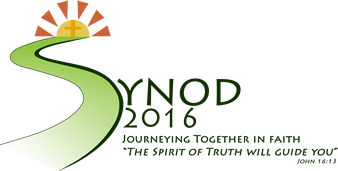Well, as a Synod delegate, I am just gathering my thoughts today following the conclusion last night of the 3-day Synod event in Limerick. It will take some time to assimilate all that’s happened over the course of the weekend and indeed over the 18 months of the preparatory journey that led up to it. But I think I can safely say that it was a hugely significant moment in the life of the Church in Ireland. And I don’t just mean historically, in terms of its being the first Diocesan Synod to be held in the country for the last 50 years.
So what stands out in the immediate aftermath?
Firstly, the aspect of inclusivity. It was after all remarkable to be in a formally convened/convoked Diocesan Synod where laity, priests and bishop were all gathered together to try to discern a way forward for the Church. That was a landmark occasion for all of us, I think.
I found the various off-the-cuff remarks made during chance meetings or during a tea break throughout the weekend quite revealing, and there were many comments on this experience, this sense of “together in journey”. One priest commented to me: “I thought I’d never see the day where lay people would have a vote in a Church Synod,” adding “should have happened a year or two after Vatican 2 of course…”
So the exercise had a strong community-building aspect. Meeting and hearing something of the faith journey of others with all the variety that involved and being moved by their commitment, whatever shade of view they might hold or express.
For me, one of the undoubted highlights was the Open Forum of yesterday afternoon which I found very moving. Those assembled were given the opportunity to express, however briefly, their sincere and in many cases passionately held views on the ‘universal’ church issues which, although outside the formal remit of a Diocesan Synod, had arisen strongly in the course of the process – issues such as gender equity, women priests, celibacy, the treatment of people in second relationships, involvement in the appointment of bishops, the new translation of the liturgy etc., – and crucially have their voices heard in the context of this representative Church gathering. Finally!
Interestingly, the treatment of women in the Church was the subject of both the opening comment from the floor and the final vote in the formal part of the Synod. The former was a call for an apology for the treatment of women by the Church down through the ages, and the latter being a proposal to establish a working group on the leadership role of women in the governance of the Church at a Diocesan and local level, which received huge support with 90% in favour, 81% of whom deemed it to be a priority, thus recording the highest ‘priority’ vote given to any of the 100 proposals voted on in the course of the Synod.
There were many moving moments. Another undoubtedly came when the priests present received affirmation of their work and service in the diocese, expressed by way of a spontaneous and prolonged standing ovation from the entire assembly. One commented quietly afterwards, that long after the discussion of the minutae of various proposals would fade from memory, the moment of that ovation would for him be an enduring memory.
And it was most important of course at the very end to hear Bishop Leahy chart the way forward from here with the new direction and initiatives, assuring the assembly that there will be a continuation of the journey thus begun and speaking of the implementation plan of Synod outcomes with an in-built review mechanism and outlining a schedule for that, an update in October and a chance to take stock together again in about a year’s time, saying: “This Synod is a real marker, but the journey goes on..”
Rath Dé ar an obair.
Ainead Ní Mhuirthile
Limerick Diocese have reports on the Synod on their website.


Well done to Limerick, hopefully your good work will encourage the other dioceses to emulate your work in enabling real community contribution in renewal of our local church here in Ireland in the knowledge that Pope Francis backs local solutions,confident in our ability to be faithful to Christ’s message and respectful of our local needs.
The Limerick Diocesan Synod was the successful accomplishment of an enlightened idea and 18 months of intense preparation. The next Synod should be inclusive of all the Dioceses of Munster, i.e. A Munster Province Diocesan Synod. Other Provinces could take their cue from that and begin the process so that it extends and expands beyond Limerick.
The issues that were spoken about but which were outside the remit of the Limerick Diocesan Synod could become the subjects of a Munster Province Diocesan Synod. They are gender equality, Women priests, Celibacy, the treatment of people in second relationships, Involvement in the appointment of Bishops, The new translation of the Liturgy and the Treatment of women in the Church. Pope Francis’ recent Document Amoris Laetitia has relevance for some of those issues outlined above.